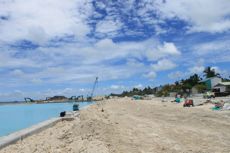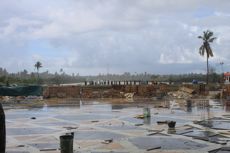Aminath Shaira, age 30 of Finolhu/Noonu atoll Manadhoo, was publicly lashed 100 times outside the Justice Building for committing fornication. Lashing is the standard punishment for intercourse outside of marriage under Maldivian law.
Shaira was sentenced to one years’ imprisonment after she was identified as the mother of a premature baby that was found on 19 May in a Coast Milk tin in the bushes near the Vilimale’ powerhouse.
Forensic experts at the time claimed the baby was dead upon birth, and had been aborted after a five-month pregnancy.
Shaira was also sentenced to 100 lashes and one year’s house arrest for fornication, the Criminal Court confirmed today. Officials said she would be transferred to a prison in the next few days.
Shaira had been charged with disobedience to an order under article 88(a) of the 1968 penal code as well as violations under the Child Protection Act.
Fingerprints belonging to Mariyam Rizna, 18, of Guraidhoo in Kaafu Atoll, had been found on the Coast Milk tin at the time. Rizna was sentenced to six months in prison for helping Shaira deliver the baby.
A third suspect, Aishath Aniya, 24, of Huraa in Kaafu Atoll, was released after the court determined that there was not enough evidence to prove that she had provided abortion pills to the defendant.
Police were unable to identify the baby’s father at the time, and Shaira did not reveal his name.
Abortion is illegal in the Maldives except to save a mother’s life, or if a child suffers from a congenital defect such as thalassemia. Anecdotal evidence, however, points overwhelmingly to a high rate of abortion and unwanted pregnancy.
Around the same time as Sharia’s arrest, a dead infant was found in a plastic bag in Male’s swimming track area. A medical examination later concluded that the baby had sustained cuts, bruises and other wounds, an indication of possible abortion practices.
In November 2010, an abandoned newborn was discovered alive in bushes near the Wataniya telecommunications tower in Hulhumale’.
In January 2010, Minivan News reported that many women unable to travel to Sri Lanka resort to illegal abortions performed by unskilled individuals in unhygienic settings.
Deputy Minister of Health and Family Fathimath Afiya told Minivan News that a meeting was held today to discuss reproductive services in the Maldives. While Maldivian and Shariah law criminalise abortion and intercourse outside of wedlock, Afiya said communication between relevant services and the judiciary made it difficult to fully address each case.
“There needs to be an appropriate legal framework for reporting these cases to the services that could help unmarried and teenage women in compromised positions,” said Afiya. “We are very concerned about the rising number of unwanted pregnancies and abortions by married and unmarried women. Today, we began formulating an action plan for short- and long-term improvements.”
The action plan, which will be finalised during a half-day workshop in November, aims to create awareness of the challenges that pregnant married or unmarried women face, and the comparative lack of appropriate services, among citizens and legislators.
“The situation is very serious, I was surprised at the work that needed to be done to improve the situation,” Afiya said.
Sexual education is not administered per se in the Maldives, and the only official study of reproductive health was done in 2004. Other unofficial studies have noted that very little information is available on the subject.
According to Afiya, up to three cases of abortion are reported by Indira Ghandi Memorial Hospital’s (IGMH) family protection unit–a scant slice of the real picture. Most abortions go unreported or are only brought to medical professionals when an unsafe abortion has damaged the mother.
The stigma of having a child out of wedlock appears to drive women to grave action. Some use abortion-inducing pills or receive injections from amateur abortionists; others turn to harmful vaginal preparations, containing chemicals such as bleach or kerosene. Although infrequent, some women insert objects into their uterus or induce abdominal trauma.
Afiya said the situation is not limited to abortions – an increasing number of women abandon their babies at the hospital after birth.
“Some will just leave after giving birth. It does happen somewhat regularly,” she said.
In 2009, a young woman convicted of having extra-marital sex was also flogged. Amnesty International called for a moratorium on the “inhumane and degrading” punishment in the Maldives.
Although flogging is still a legal form of punishment in many Muslim countries worldwide, Amnesty officials claim that it specifically discriminates against women. Of the 184 people sentenced to lashing in 2006, 146 were female.


